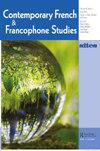寓言与控诉:伊斯兰左派的修辞
IF 0.2
4区 文学
0 LITERATURE, ROMANCE
引用次数: 0
摘要
摘要尽管对世俗主义的历史和人类学批评揭示了其矛盾的主张,但他们对世俗主义修辞力量,即其表演效果的关注较少。在更广泛地理论化“Islamo Gauchisme”的修辞和当代世俗主义之前,本文首先将这种疏忽追溯到人类学家塔拉尔·阿萨德对宗教和世俗主义的批评(199320032018)中的一条有影响力的论点,该论点反对世俗主义(假定)透明和指涉的语言和自主主体,源自新教,到表演性的、教学性的话语,以及虔诚教义的权威传统,尤其是中世纪基督教和当代伊斯兰教的主题。接下来,文章通过突出沃尔特·本雅明(2019)和保罗·德曼(1983)对巴洛克和前浪漫主义寓言的处理中世俗修辞的表演性和引用性,或“戏剧图形”(Weber 2001),为理论化奠定了基础。最后,它阅读了当代法国政治中公开的世俗(laïc)修辞中指责和寓言的表演力量。本文章由计算机程序翻译,如有差异,请以英文原文为准。
Allegory and Accusation: The Rhetoric of Islamo-gauchisme
Abstract While historical and anthropological critiques of secularism have illuminated its contradictory claims, they have been less attentive to secularism’s rhetorical force, i.e., its performative effect. Before theorizing the rhetoric of “Islamo-Gauchisme” and contemporary secularism more broadly, then, this article first traces this inattention to an influential line of argument grounded in anthropologist Talal Asad’s critiques of religion and secularism (1993, 2003, 2018), which opposes secularism’s (putatively) transparent and referential language and autonomous subject, derived from Protestantism, to the performative, pedagogical discourse and subject of authoritative traditions of pious discipline, medieval Christianity and contemporary Islam, in particular. Next, the article lays the ground for theorization by foregrounding the performative and citational, or “theatro-graphic” (Weber 2001), qualities of secular rhetoric in Walter Benjamin’s (2019) and Paul de Man’s (1983) treatments of Baroque and pre-romantic allegory. It closes by reading the performative force of accusation and allegory in the avowedly secular (laïc) rhetoric of contemporary French politics.
求助全文
通过发布文献求助,成功后即可免费获取论文全文。
去求助
来源期刊

Contemporary French and Francophone Studies
LITERATURE, ROMANCE-
CiteScore
0.30
自引率
0.00%
发文量
43
期刊介绍:
An established journal of reference inviting all critical approaches on the latest debates and issues in the field, Contemporary French & Francophone Studies (formerly known as SITES) provides a forum not only for academics, but for novelists, poets, artists, journalists, and filmmakers as well. In addition to its focus on French and Francophone studies, one of the journal"s primary objectives is to reflect the interdisciplinary direction taken by the field and by the humanities and the arts in general. CF&FS is published five times per year, with four issues devoted to particular themes, and a fifth issue, “The Open Issue” welcoming non-thematic contributions.
 求助内容:
求助内容: 应助结果提醒方式:
应助结果提醒方式:


